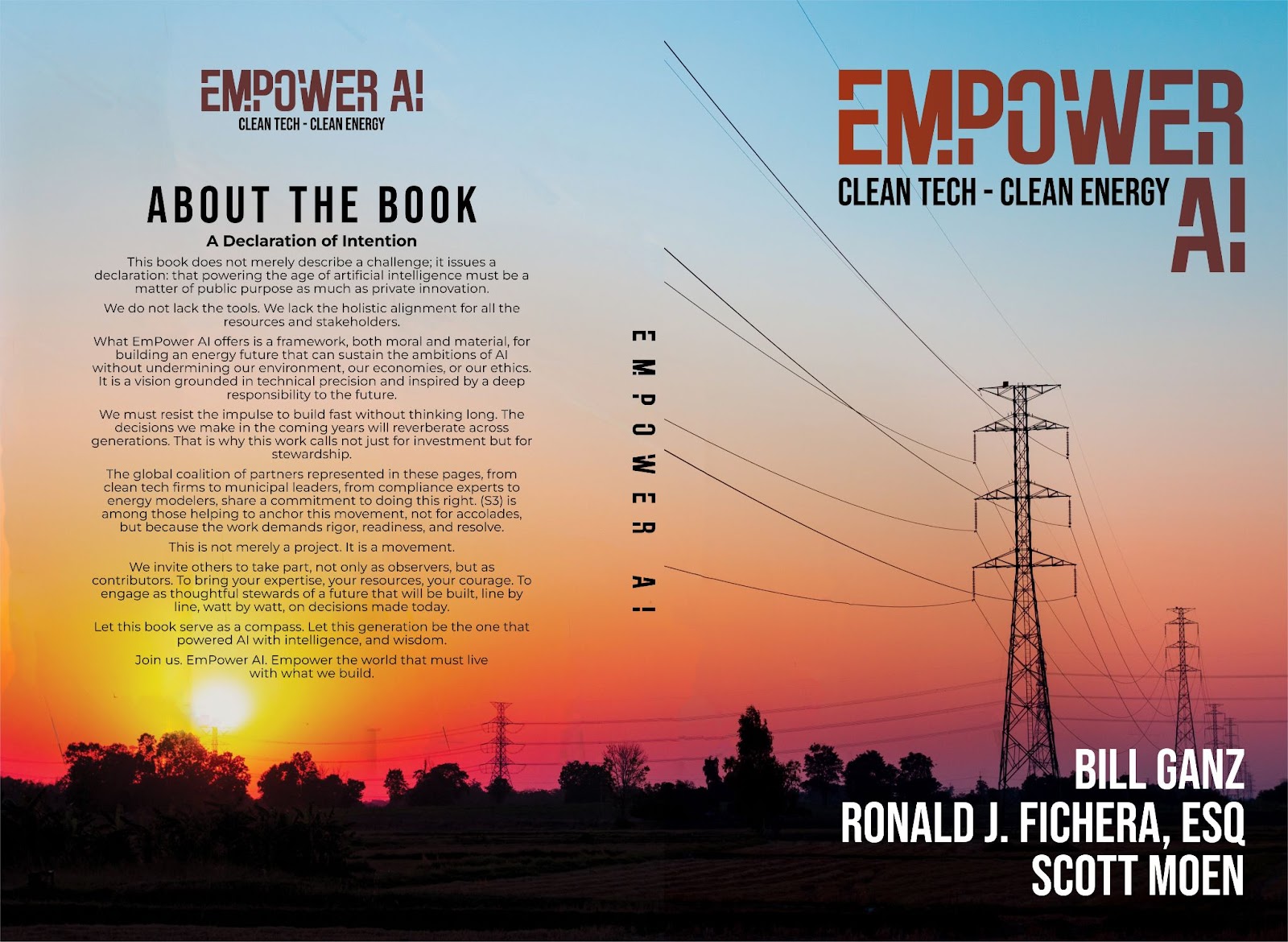AI Energy
In the midst of a global energy transformation and grid instability a groundbreaking book, EmPower AI, emerges as a strategic call to action for businesses, policymakers, and innovators alike. Co-authored by Bill Ganz, Ronald J. Fichera,esq and Scott Moen, EmPower AI is not just a book, it’s a mission-critical framework designed to tackle one of the 21st century’s most pressing challenges: powering artificial intelligence sustainably, affordably, and efficiently.
A New Infrastructure for a New Intelligence
This book is the product of collaboration across disciplines and continents, a collective effort to address one of the defining challenges of our time: powering artificial intelligence at scale, responsibly and sustainably.
As AI systems grow in complexity and capability, so too do the demands they place on our energy systems. The computational infrastructure of massive data centers now rivals some of the largest industries in energy demand. Meeting this need isn’t just a technical hurdle, it’s a systemic challenge that spans infrastructure, policy, capital markets, environmental safeguards, and ethics.
The solutions? They must be integrated, scalable, and visionary. What lies ahead is nothing short of a digital industrial revolution, where clean, smart, resilient infrastructure plays a central role. The stakes are global: done well, this transformation can uplift economies and empower communities; done poorly, it could strain ecosystems and widen inequities.
At the heart of this revolution is the principle of partnership between public institutions and private enterprise, between regulators and innovators, between local execution and global goals.
Led by the work of S3, and rooted in innovations in Clean Tech integration, effective Net Zero Energy strategies, and Indoor Air Quality solutions, EmPower AI offers 24 chapters framed around Socratic inquiry, each revealing how energy efficiency can be the unsung hero of the AI era. Instead of relying solely on wind or solar, the book demonstrates how AI-powered building management and hardware systems can reclaim, redirect, and reinvest non-productive building energy more efficiently and rapidly.
Meet the Authors:
- Bill Ganz: A Los Angeles-based entrepreneur and clean tech visionary, Bill brings decades of experience from media, marketing and investment ventures into the realm of energy innovation. Having spent the last decade plus understanding advanced energy efficiency strategies, Bill’s mission is clear: deliver scalable, compliant, and cost-saving clean energy systems that serve businesses, enterprises and governments of every size.
- Ronald J. Fichera: With over 35 years of international legal and corporate experience across 20+ countries, Ron brings a deep understanding of internet legal compliance, business strategy, and high-stakes negotiations. At S3, he ensures clean energy solutions are not only innovative but also legally sound and strategically implemented, bridging the gap between regulation and opportunity.
- Scott Moen: A respected lobbyist and public affairs leader with more than 25 years in policy development, Scott brings a unique perspective shaped by his Minnesota farm roots and his pragmatic, consensus-building approach. His deep knowledge of public utility regulation and environmental policy makes him instrumental in aligning EmPower AI’s strategies with legislative pathways and public support.
A Movement Rooted in AI Energy Efficiency
What sets EmPower AI apart is its central thesis: smart, AI-driven energy management systems can unlock more usable energy from buildings than traditional renewables can generate. And they can do it now, faster, cheaper, and with fewer regulatory barriers, all with the intention of avoiding high risk and extraordinary cost.
Gone are the days when energy efficiency was only accessible to large corporations with massive capital. Through the innovations presented in EmPower AI, businesses of all sizes, from Fortune 500 headquarters, government and military facilities to massive industrial facilities and warehouses, all the way down to franchise restaurants and local businesses can reduce operational costs, enhance indoor air quality, and help contribute to carbon reduction goals.
And this movement isn’t just about helping to ensure that utility costs don’t go up for constituent residents and businesses, it’s about creating jobs, supporting union trades, and fueling the need for trade schools and skilled labor. It’s about helping policymakers support constituents, residents, and businesses through cost-effective decarbonization actions.
The Vision of a Perpetual Economy
The book introduces the idea of a Perpetual Economy, a system where sustainability and profitability co-exist, and energy efficiency is seen as an economic driver rather than a compliance burden. This vision speaks directly to the heart of current recession concerns, offering cost-cutting solutions at a time when businesses need them most.
Even during the pandemic, when HVAC costs soared due to health and safety upgrades, S3’s methodologies showed that energy efficiency can be achieved without compromising indoor air quality, and often with dramatic operational savings.
A Call to Act, Adapt, and Accelerate
This isn’t just a thought piece, it’s a playbook for action. It proves that with the right strategy, clean energy is not just environmentally necessary, it’s economically smarter. It redefines what’s possible for building performance, turning efficiency into a strategic asset that supports business growth, grid stability, and AI scalability with the intent to potentially avoid all the up and downstream negative ramifications of the growth of artificial intelligence.
To learn more about EmPower AI or to schedule a conversation with Bill Ganz, you can connect with him directly on LinkedIn or visit the S3 website at: www.sterilesafesolutions.com.

































